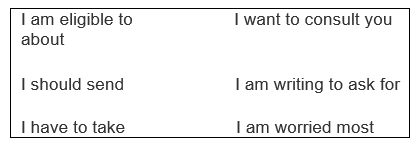Unit 7 lớp 11: Further Education - Writing
Bài học Unit 7 lớp 11 mới phần Writing cung cấp cho các em các thông tin về việc học ở Vương quốc Anh, qua đó hướng dẫn các em lập dàn ý và viết một email hỏi về thông tin và lời khuyên cho việc du học. Mời các em cùng tham khảo!
Mục lục nội dung

Unit 7 lớp 11: Further Education - Writing
Studying in the United Kingdom (Việc học ở vương quốc Anh)
1. Task 1 Unit 7 lớp 11 Writing
Read Mai’s email to her friend asking for information about higher education in the UK. Fill the gaps, using the phrases in the box. (Đọc email của Mai gửi cho bạn xin thông tin về giáo dục đại học ở Vương quốc Anh. Điền vào ô trống, dùng các cụm cho sẵn trong hộp.)

Guide to answer
Dear Kevin,
(1) I am writing to ask you for some information and advice on higher education in your country.
I am going to finish secondary school this summer and I have been thinking about pursuing higher education in the UK. Here are the points that (2) I want to consult you about.
First, what are the university entry requirements for international students in the UK? What (3) I am worried most is my academic qualifications and transcript. As a school leaver, I will be awarded a certificate of secondary school graduation and given a transcript of marks for all subjects. Will that be enough? Do (4) I have to take any university entrance examinations?
In addition, what types of accommodation are available for international students? Some institutions provide accommodation in halls of residence or university houses but how can I find out if (5) I am eligible to apply for accommodation and when (6) I should send my application? What is the rent for each type of accommodation? Is it monthly or weekly paid?
I wish you and your family the best. I look forward to hearing from you soon.
Regards,
Mai
Tạm dịch:
Kevin thân mến,
Tôi viết thư yêu cầu một số thông tin và lời khuyên về giáo dục đại học ở nước bạn.
Tôi sắp hoàn thành chương trình trung học mùa hè này và tôi đã nghĩ đến việc theo đuổi nền giáo dục cao học tại Anh. Đây là những điểm mà tôi muốn hỏi ý kiến bạn.
Thứ nhất, yêu cầu nhập học đại học cho sinh viên quốc tế ở Anh là gì? Điều mà tôi phải lo lắng nhất là trình độ học vấn và bảng điểm của tôi. Với tư cách là học sinh ra trường, tôi sẽ nhận được giấy chứng nhận tốt nghiệp trung học và nhận bảng điểm cho tất cả các môn học. Liệu đó có đủ không? Tôi phải làm gì khi đi thi tuyển sinh đại học?
Ngoài ra, những loại nhà ở nào dành cho sinh viên quốc tế? Một số cơ sở cung cấp chỗ ở trong ký túc xá hoặc nhà ở trong trường đại học nhưng làm thế nào tôi có thể tìm hiểu xem tôi có đủ điều kiện để đăng ký chỗ ở và khi nào để tôi nên gửi đơn của tôi? Tiền thuê cho từng loại nhà ở là gì? Có thanh toán hàng tháng hoặc hàng tuần không?
Gửi lời chúc tới bạn và gia đình. Mong sớm nhận được hồi âm từ bạn.
Trân trọng,
Mai
2. Task 2 Unit 7 lớp 11 Writing
Read the email in 1 again and complete the following outline. (Đọc lại email ở bài tập 1, sau đó hoàn thiện dàn ý dưới đây.)

Guide to answer
1. Dear Kevin,
2. I am writing to ask for some information and advice on higher education in yo country.
3. What are the university entry requirements for international students in the UK?
4. What types of accommodation are available for international students?
5. I wish you and your family the best. I look forward to hearing from you soon.
6. Regards
3. Task 3 Unit 7 lớp 11 Writing
Choose two of the following points about studying abroad. Write an email of 160 - 180 words to a friend from another country asking for information and advice. Use the outline in 2. (Chọn hai trong số các chủ đề dưới đây về du học. Viết email dài 160-180 từ cho bạn nước ngoài hỏi thông tin và xin lời khuyên về du học. Sử dụng dàn bài ờ bài tập 2.)
1. Work experience for career-based courses (Kinh nghiệm làm việc cho các khóa học hướng nghiệp)
2. Tuition fees at colleges and universities (Học phí tại các trường cao đẳng và đại học)
3. Travelling in your host city and country (Du lịch trong thành phố và đất nước của bạn)
4. Experiencing culture shock when studying abroad (Trải nghiệm cú sốc văn hoá khi du học)
5. Working part-time (Làm việc bán thời gian)
6. Opening a bank account (Mở tài khoản ngân hàng)
7. Surviving the cold and wet weather (Sinh tồn trong thời tiết lạnh và ẩm ướt)
8. Visas and other documents (Thị thực và các tài liệu khác)
Guide to answer
Dear Susan,
I am preparing for going to America to study medicine. I don't think I will have many problems with culture shock, but I should know well about it before I fly. Once I am in America; of course, I will have to tace the unfamiliar around me and may feel confused sometimes.
I am thinking of you now and writing to ask you about ways how to deal with culture shock. Tell me please in detail what I should do to understand a different culture, how I can get balance in my new life, and what I should learn to adapt to it. I have spent a lot of time reading through travel forums, guidebooks, news reports... but what I have read is so general.
One more thing, Susan, what is the best way to get involved with the local community? What are the cultural activities that often take place there? I will no longer feel culture shock when I am used to living in their lifestyle, I think.
Finally, I wish you and your family the best. I look forward to hearing from you soon. Regards,
Phương Anh
Tạm dịch:
Susan thân mến,
Tôi đang chuẩn bị sang Mỹ học ngành y. Tôi không nghĩ mình sẽ gặp nhiều vấn đề về sốc văn hóa, nhưng tôi nên biết rõ về nó trước khi bay. Một khi tôi ở Mỹ; tất nhiên, tôi sẽ phải che giấu những điều không quen thuộc xung quanh mình và đôi khi có thể cảm thấy bối rối.
Giờ tôi đang nghĩ đến bạn và viết thư này để hỏi bạn về cách đối phó với cú sốc văn hóa. Vui lòng cho tôi biết chi tiết những gì tôi nên làm để hiểu về một nền văn hóa khác, cách tôi có thể cân bằng trong cuộc sống mới và những gì tôi nên học để thích nghi với nó. Tôi đã dành rất nhiều thời gian để đọc qua các diễn đàn du lịch, sách hướng dẫn, các bản tin ... nhưng những gì tôi đọc được là quá chung chung.
Một điều nữa, Susan, cách tốt nhất để tham gia với cộng đồng địa phương là gì? Các hoạt động văn hóa thường diễn ra ở đó là gì? Tôi nghĩ tôi sẽ không còn cảm thấy sốc văn hóa khi đã quen với lối sống của họ.
Cuối cùng, tôi xin chúc bạn và gia đình những điều tốt đẹp nhất. Tôi mong sớm nhận được hồi âm từ bạn. Trân trọng,
Phương Anh
4. Practice Task 1
Read the following passage and mark the letter A, B, C, or D to indicate the correct word or phrase that best fits each of the numbered blanks.
GAP YEAR
In the professional or career world, a gap year is a year before going to college or university and after finishing high school or (1) ____ a year off before going into graduate school after completing a bachelor as an undergraduate. (2) ____ this time, students may engage in advanced academic courses, extra-academic courses and non-academic courses, such as yearlong pre-college math courses, language studies, learning a trade, art studies, volunteer work, travel, internships, sports and more. Gap years are sometimes considered a way for students to become independent and learn a great deal of (3) ____ prior to engaging in university life.
Australians and New Zealanders have a tradition of travelling overseas independently (4) ____ a young age. In New Zealand, this is known as “doing an OE” (Overseas Experience). Sometimes, an OE is (5) ____ to one year, but often Australians and New Zealanders will remain overseas for three to five years, with many working short-term in service industry jobs to fund their continuing travels. Europe and Asia are popular destinations for doing an OE. In Australia, through exchange programmes and benefits for youth, there are so many opportunities for a young person to broaden their (6) ____ through travel in a gap year.
Question 1. A. calling B. going C. taking D. turning
Question 2. A. During B. When C. While D. By
Question 3. A. responsible B. responsibility C. irresponsible D. irresponsibility
Question 4. A. at B. on C. in D. for
Question 5. A. distributed B. used C. spent D. limited
Question 6. A. head B. mind C. brain D. memory
5. Practice Task 2
Mark the letter A, B, C, or D to indicate the sentence that best combines each pair of sentences in the following questions.
Question 1. Marie prepared her homework carefully. She could answer all the questions and got good marks.
A. Although she prepared her homework carefully, Marie could not answer all the questions and got good marks.
B. Having prepared her homework carefully, Marie could answer all the questions and got good marks.
C. If she had prepared her homework carefully, Marie could have answered all the questions and got good marks.
D. It was because of her careful preparation for the homework, Marie couldn't answer all the questions and got good marks.
Question 2. We have been trying to learn English for years. We haven't succeeded yet.
A. Although we have been trying to learn English for years, we haven't succeeded yet.
B. After we've been trying to learn English for years, we have succeeded.
C. We haven't succeeded yet since we have been trying to learn English for years.
D. We have been trying to learn English for years, so we haven't succeeded yet.
6. Conclusion
Kết thúc bài học, các em cần làm bài tập đầy đủ, nắm được các ý chính về việc học ở Vương quốc Anh và có khả năng lập dàn ý cũng như viết một email hỏi về thông tin và lời khuyên cho việc du học từ một người bạn ở quốc gia đó.
Tham khảo thêm
- doc Unit 7 lớp 11: Further Education - Getting Started
- doc Unit 7 lớp 11: Further Education - Language
- doc Unit 7 lớp 11: Further Education - Reading
- doc Unit 7 lớp 11: Further Education - Speaking
- doc Unit 7 lớp 11: Further Education - Listening
- doc Unit 7 lớp 11: Further Education - Communication and Culture
- doc Unit 7 lớp 11: Further Education - Looking Back
- doc Unit 7 lớp 11: Further Education - Project




